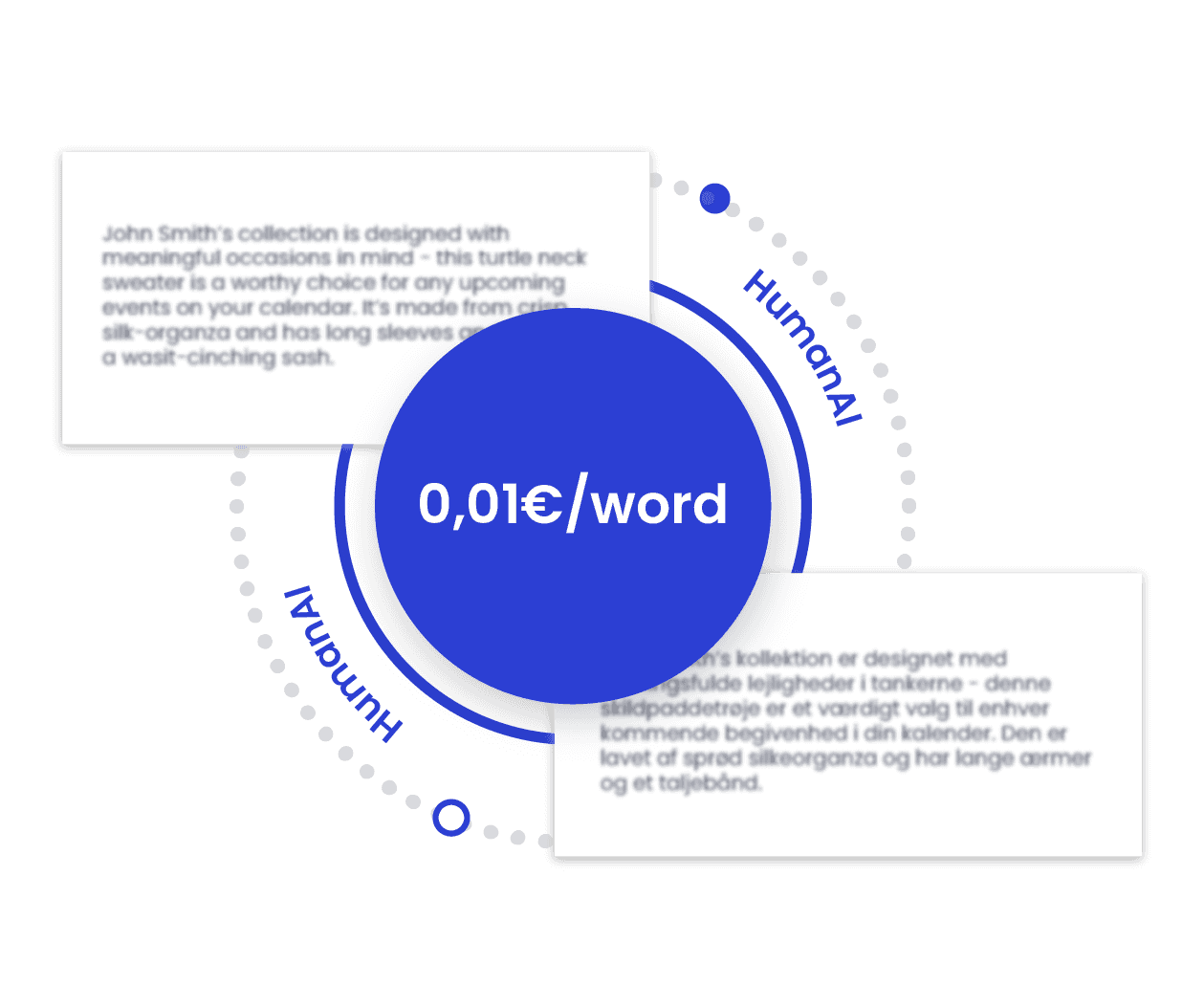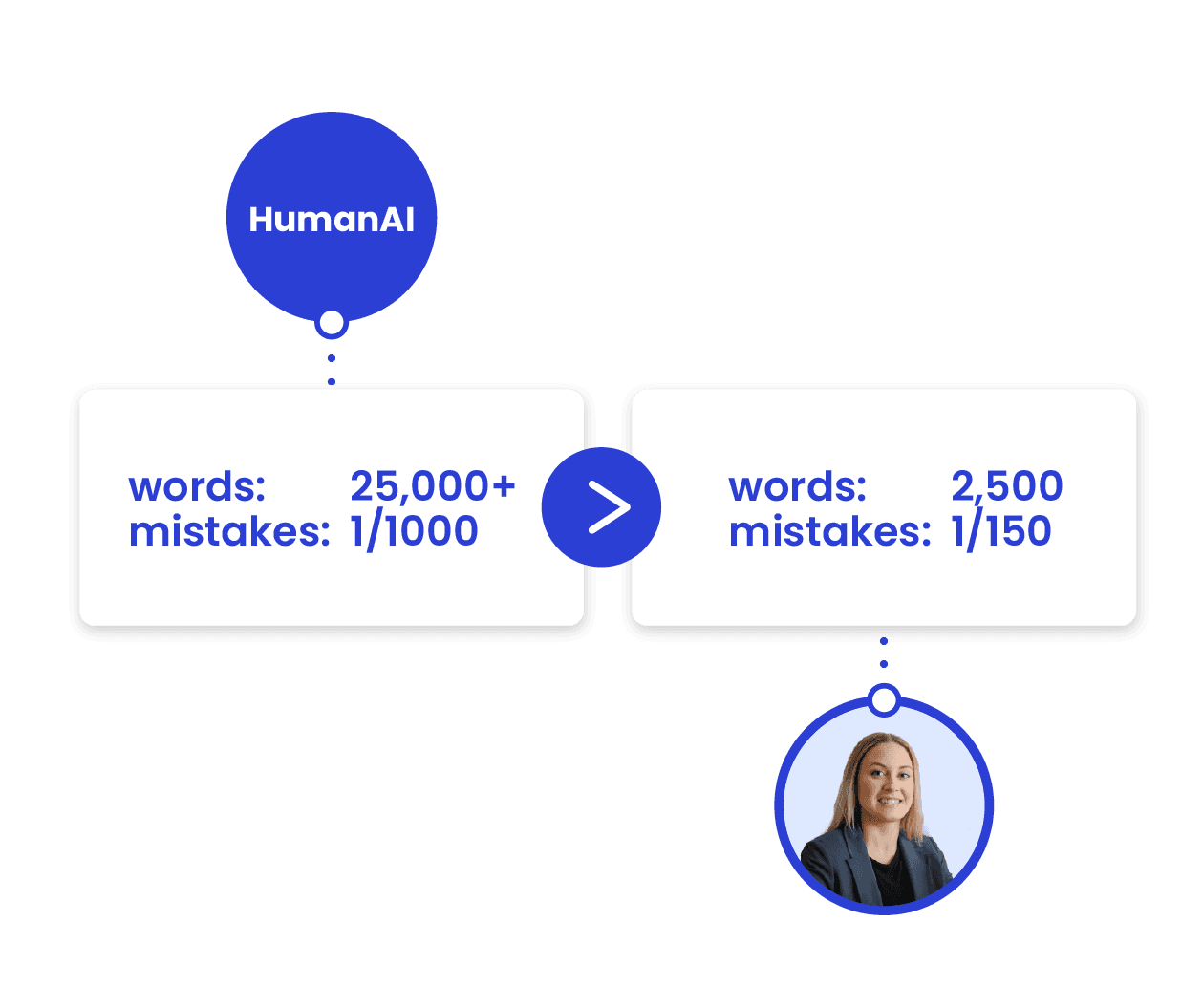WHAT WE OFFER
HumanAI translation
Experience translations that are faster, cheaper and better quality than traditional translation methods.

WHAT WE OFFER
HumanAI translation
Experience translations that are faster, cheaper and better quality than traditional translation methods.


Unique blend of AI and humans
90% faster than traditional translation

0.01 € per translated word


Unique blend of AI and humans
90% faster than traditional translation

0.01 € per translated word

10 X FASTER THAN TRADITIONAL TRANSLATIONS
Experience fast translations with HumanAI, processing up to 25,000 words daily, providing unparalleled speed and efficiency for your content needs.
HUMAN QUALITY ASSURANCE
COST-EFFECTIVE SOLUTIONS
SCALABILITY & FLEXIBILITY

10 X FASTER THAN TRADITIONAL TRANSLATIONS
Experience fast translations with HumanAI, processing up to 25,000 words daily, providing unparalleled speed and efficiency for your content needs.
HUMAN QUALITY ASSURANCE
COST-EFFECTIVE SOLUTIONS
SCALABILITY & FLEXIBILITY

10 X FASTER THAN TRADITIONAL TRANSLATIONS
Experience fast translations with HumanAI, processing up to 25,000 words daily, providing unparalleled speed and efficiency for your content needs.
HUMAN QUALITY ASSURANCE
COST-EFFECTIVE SOLUTIONS
SCALABILITY & FLEXIBILITY


High quality translations for 0.01€ per word
The cost-effective rate of 0.01 € per translated word and strategic human edits reduce the need for extensive reviews. This streamlined approach results in translations taking only 1/10 of the time compared to traditional methods, providing increased scalability for translating more on-brand content in less time and at a lower cost.
Redefining “human quality" translations
While traditional translations typically handle 2,500 words per day, HumanAI can process at least 25,000 words daily, increasing the turnaround time for translations tenfold. Additionally, the quality benchmark for traditional translations consists of 1 mistake in every 150 words, whereas HumanAI's quality analysis showcases an accuracy rate of 1 mistake per every 1,000 words. This emphasizes how HumanAI streamlines processes by delivering translations 10 times faster without compromising quality.


High quality translations for 0.01€ per word
The cost-effective rate of 0.01 € per translated word and strategic human edits reduce the need for extensive reviews. This streamlined approach results in translations taking only 1/10 of the time compared to traditional methods, providing increased scalability for translating more on-brand content in less time and at a lower cost.
Redefining “human quality" translations
While traditional translations typically handle 2,500 words per day, HumanAI can process at least 25,000 words daily, increasing the turnaround time for translations tenfold. Additionally, the quality benchmark for traditional translations consists of 1 mistake in every 150 words, whereas HumanAI's quality analysis showcases an accuracy rate of 1 mistake per every 1,000 words. This emphasizes how HumanAI streamlines processes by delivering translations 10 times faster without compromising quality.

Key benefits of HumanAI

On-brand content in any language

Drives translation costs and time by 90%

Insurance of human quality
Key benefits of HumanAI

On-brand content in any language

Drives translation costs and time by 90%

Insurance of human quality
Key benefits of HumanAI

On-brand content in any language

Drives translation costs and time by 90%

Insurance of human quality
Users love us





Excellent service and great translation
The software is easy to use and the service team supports you all the way if needed.
Customer comes first
Rarely does one have the pleasure of working with a company with such clear values towards customer satisfaction.
Users love us





Excellent service and great translation
The software is easy to use and the service team supports you all the way if needed.
Customer comes first
Rarely does one have the pleasure of working with a company with such clear values towards customer satisfaction.
Users love us





Excellent service and great translation
The software is easy to use and the service team supports you all the way if needed.
Customer comes first
Rarely does one have the pleasure of working with a company with such clear values towards customer satisfaction.
Better than human translations
Step into the future of translation services with HumanAI - where AI and human collaboration set a new standard for on-brand global communication
Better than human translations
Step into the future of translation services with HumanAI - where AI and human collaboration set a new standard for on-brand global communication
LangOps Platform
Services
Titangade 9-11, 2200 Copenhagen N, Denmark
Tel: +45 70 20 55 50 | hello@easytranslate.com
Copyright Ⓒ 2025 EasyTranslate A/S. All rights reserved.
VAT: DK33240562
LangOps Platform
Services
Titangade 9-11, 2200 Copenhagen N, Denmark
Tel: +45 70 20 55 50 | hello@easytranslate.com
Copyright Ⓒ 2025 EasyTranslate A/S. All rights reserved.
VAT: DK33240562
LangOps Platform
Services
Titangade 9-11, 2200 Copenhagen N, Denmark
Tel: +45 70 20 55 50 | hello@easytranslate.com
Copyright Ⓒ 2025 EasyTranslate A/S. All rights reserved.
VAT: DK33240562





